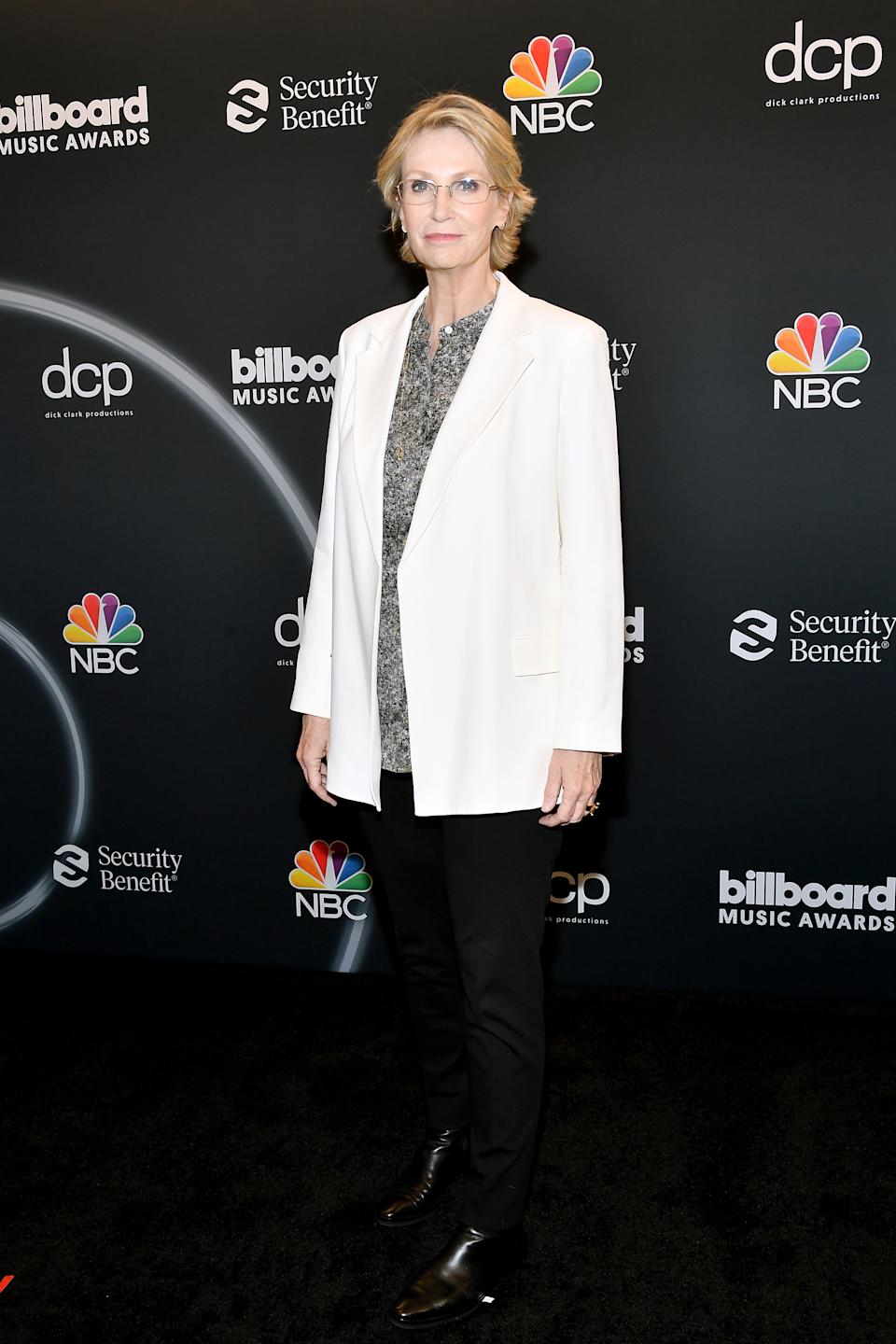Jane Lynch has seen it all.
In a new interview with The Guardian, the actress, 61, opened up about her villainous and lovable character Sue Sylvester, the maniacal cheerleading coach on Glee.
Lynch said the character, known for her “problematic” sense of humor — which included racist and fat-shaming jokes — probably would not be welcome today.
“I think there would have been people out there who would have wanted to cancel Sue Sylvester,” she said. “I don’t know that we could have done that show today.”
“There’s a kind of a rabid anonymous group of folks who can really change somebody’s life; they could take away their career,” Lynch added. “Some of it is about time – some of these people have got called on their stuff [from the past]. But I think we get carried away. This preoccupation with going ‘Aha!’, that’s a drag. Hopefully we’ll get over that soon.”
At the end of the show’s run, Sylvester — who became vice president of the United States — announces her ambition to run for the presidency in 2024. Looking back at the storyline, Lynch can’t help but laugh.
“She would be MAGA,” she said of Sylvester.
Known for its wide representation of LGBTQ characters, Lynch, who is a lesbian, said having a show like Glee when she was growing up would have “been such a relief” as a teenager.
“If I had something like Glee, where it was stories that you could relate to on a deep level, that maybe as a person in high school you couldn’t express, yeah, I would have loved it,” she said. “I don’t mean to overstate it, but I do think it might really have helped a lot of kids.”
While the actress and LGBTQ activist has made audiences laugh for decades, little do her fans know that Lynch’s zest for life wasn’t always so colorful.
Lynch battled alcoholism for decades before finally getting sober. However, she admitted to relapsing five years ago, which she kept secret from her family and friends.
“The first time you [have a drink], it’s like: ‘Ah, I found it. I feel happy in my body, this feeling of bliss. No one can say anything to me that would make me upset or feel badly about myself right now,'” Lynch recalled of her drinking, which began as a teenager and carried well into her mid-30s. “And then maybe the next time you drink, you get it again. But before you know it, it’s not doing it for you.”
“For the most part, when I was in the throes of addiction, it wasn’t working,” she added. “You end up chasing [that feeling]. And then if you’re not chasing that, what are you doing? Who are you? You have to really face this emptiness.”
Still, despite her heavy drinking that sometimes would last all the way to sunrise the next morning, Lynch was working rather steadily. That is, until one day when she just decided to stop cold turkey and join Alcoholics Anonymous.
“I felt sorry for people who weren’t alcoholics: I just loved AA,” she said of that time. “It was very much a gift; it was almost like I was struck sober.”
Throughout her sobriety, Lynch’s career was skyrocketing. Drowning in “white-hot ambition,” she wrote and performed in a one-woman show, which “blew the doors off my confidence” and brought her into a “really good space” where “all of that loneliness and alienation didn’t have a place to land anymore.”
That lasted until about five years ago, when she thought she was in a place to enjoy a glass of wine at dinner.
“I loved it,” she said of that first drink, which drove her back into alcoholism for another three years.
“I became a connoisseur of wine in a way that only an alcoholic can,” she explained. “I went back into denial, after all those years of sobriety and self-knowledge. I fooled myself – I woke up one day and went: ‘I’m back.’ It took about three years. I’m telling people I’m drinking one glass of wine a night, and I’m drinking five.”
“I was a little ashamed, and also the denial, the justifications,” she said of her relapse. “My friends were fooled. I remember a friend said: ‘I told you you’re not an alcoholic anymore.’ I’d go, ‘I know!’ [But] I was.”
Just like the first time, Lynch said she was struck sober as if “the sober fairy said: ‘OK, I’m giving you one more chance.’ And it was over. Five o’clock would come and I didn’t notice it.”
Now, Lynch is gearing up for Broadway’s Funny Girl, set to open this spring. When asked if she ever gets sick of being stereotyped as the “deranged authority figure” who’s “obsessed with that random exercise of power, power for power’s sake,” all she can do is laugh.
“Oh, not at all,” she said. “I’ll do the same thing over and over again. I don’t care. I love it.”




